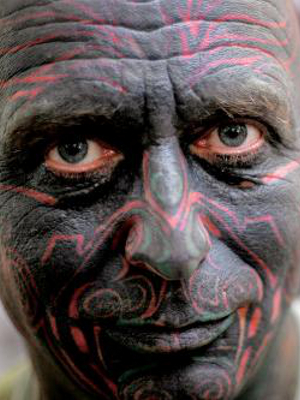The first direct presidential elections in the history of the Czech Republic, wherein the president is elected by popular vote, were scheduled to be held this January. The candidates, eleven in all, are a quirky carousel of characters, ranging from Jan Fischer, a former communist who apologizes for his past and who was also a post-1989 prime minister, to Vladimír Franz, a painter and composer whose entire body and face is covered by a collection of blue tattoos, earning him the nickname of “Avatar.”
Since its inception in 1918, the presidents of free Czechoslovakia were always elected by parliament, and there are many people who still feel that this should be the case. Both sides do agree on one thing: a high voter turnout, though they disagree on just what this foray into representative democracy will really mean.
Following 1989, it seemed that all Czechs were ready to immerse themselves in a new democratic order, particularly with Vaclav Havel, a leader who, to this day, is spoken of like a beloved grandfather instead of a politician. But things soon soured, and the country has experienced growing pains with its democratization, with both corruption and disenchantment increasing. According to the Institute for Democracy and Electoral Assistance, the voter rate has reflected the frustrations, and predictably has followed a downward trend: from a 96% turnout rate in the 1990 parliamentary election—the first following the Revolution—the percentage of voter turnout has dropped in every proceeding year to st 62.6% in the parliamentary elections in 2010 and to around 35% in the recent regional elections this year.
The reason for this, according to Jiří Pehe, a political analyst and former advisor to Havel, is two-fold. The first and more basic reason is voters’ feeling of relative security. “[People feel that] ‘My vote really doesn’t matter, the system is stable, I don’t have to mobilize to get up and go and vote,’” he said. This, he continued, was a result of the past 23 years—a relatively calm and stable period. However, Pehe notes a second, more deeply felt reason: an intense distrust of the government and the political parties who control it. “There is a really deep dissatisfaction of people with politics, and in particular right now with the current governing coalition,” Pehe said. This dissatisfaction—particularly with the corruption that runs rampant in both local and national politics—has left a sour taste in the mouths of many. Ultimately, voters feel the system is poisoned, and electing someone new serves only to mask the problem.
Voter apathy has crept into all generations, even to those that can’t yet vote. In a random survey of 15 teenagers ages 14-16, only one said that he or she planned vote once the opportunity arose. 10 said that they did not plan to vote, and four said they did not know. Only one—the same respondent who planned to vote—said they were active in political groups at school. When asked whether their parents voted, almost half answered no.
Another possible reason for voter apathy is the lackluster presence of the parties themselves. This, according to journalist Karel Hvížďala, is partly due to the country’s age. “The country is very, very young. The system is very new, and no one knows how to run [a] democracy.” “One of the specific features of the Czech system is that our political parties have never developed into what I call real political parties. They are very small,” notes Pehe. These parties do not have a real mobilizing force, and this is one of the things that is a real weakness of the Czech political system,” he continues, and contrasts this with the parties of Austria and Germany, which have far larger party membership and thus a much more potent ability to wield power as well as voter turnout. In Austria, voter turnout for the Parliamentary elections was 81.7% in 2008, while in Germany it was 70.8% in 2009.
“The reason why it developed this way is partly because the system is too young, and partly because politics here [were] privatized into the hands of the powerful behind-the-scenes economic interests early on. In the process, they somehow forgot to pay attention to political parties.”
And so, back to the upcoming presidential elections, which are expected to be well-attended. “[With] the first elections in January, I suppose there will be a huge turnout. Simply because it’s new, and everyone wants to vote, and everyone wants to elect his or her president for the first time. Ten years from now, it may be, just like in many other countries, barely 50 percent. But that’s that,” says Pehe.
But democracy, especially representative democracy, isn’t an endpoint. It’s a process, and the only alternative, besides letting it fall to the wayside, or burning it to the ground, is to keep working at it. Direct elections may not dramatically enhance voter turnout, but this doesn’t mean they don’t matter. . The very existence of this act of change is valuable. It points to a more fluid future—one in which the process will continue.
published: 17. 2. 2013







